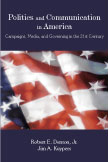1. Political Communication Defined
General Characteristics of Political Communication / Political Communication Defined
2. Language and Politics
Communication, Society, and Social Order / Generating Political Support / Political Language
3. Functions, Styles, and Strategy: The Uses of Political Language
Functions of Political Language / Functions and Styles of Governmental Language / Strategic Uses of Political Language
4. Political Socialization and the Formation of Political Attitudes
The Political Socialization Process / Issues of Political Socialization
5. The Media and Politics
Media and Politics: Traps and Clarifications / Basic Frameworks for Assessing Political Media / Message Saliency: Basic Considerations
6. Agenda Setting, Agenda Extension, and the Political Landscape
Agenda Setting / Agenda Extension / Types and Sources of Bias in the News Media
7. The Internet Influence: Online Political News and Political Discourse
Past to Present / The Internet, Political Campaigns, and Political News
8. Campaign Planning, Management, Strategies, and Tactics
Campaign Planning / Campaign Management / Campaign Strategy / Campaign Tactics
9. Presidential Campaigns
The Process / Phases of the Presidential Campaign / Strategies and Campaign Communication
10. Congressional and Senatorial Campaigns
Candidate-Centered Campaigns / Strategic Context / Campaign Organization / Strategies and Tactics
11. Local and State Campaigns
Context of the Race / Campaign Organization / Campaign Activities / Campaign Literature / Media Considerations / GOTV
12. The Presidency
Executive Leadership / Governing
13. Congress
Legislative and Communication Functions / Legislative Communication and Deliberation / The Built-In Dilemmas of Legislative Communication / External and Internal Audiences
14. The Courts
Three Functions of the Courts / Politics and the Courts / The Courts in Times of National Emergencies / Communication Skills and the Legal Profession / The Publicity Functions of Litigation / Television and the Courts
15. Politics and Popular Culture
The Culture of Division / Political Storytelling through Film / Political Talk / Two Recurring Themes in the Analysis of Popular Entertainment
16. Political Ethics: An Oxymoron?
Ethics and Our National Character / Democracy, Leadership, and Ethics / Constitutional Authority and Public Morality / Political Communication and Ethics

353 pages, $47.95 list
1-57766-533-3
978-1-57766-533-5
© 2008
paperback
eBook availability
Politics and Communication in America
Campaigns, Media, and Governing in the 21st Century
Communication provides the basis of social cohesion, issue discussion, and legislative enactment—core features of political activity and governing in the United States. Denton and Kuypers, experts in the field of political communication, synthesize materials and sources from political science, communication, history, journalism, and sociology to demonstrate how communication intersects with these fields to formulate political beliefs, attitudes, and values. Conventional categories of political activity—campaigns, activity in Congress, the courts, the mass media, and the presidency—structure the discussions. Theoretical and applied concepts drawn from firsthand sources and classic historical works, plus extensive use of contemporary examples, enrich understanding.
Written in an engaging, accessible style that is geared to an undergraduate audience, the text ignites readers’ awareness that the essence of politics is talk or human interaction. Such interaction is formal and informal, verbal and nonverbal, public and private—but always persuasive in nature, causing audiences to interpret, to evaluate, and to act.
Written in an engaging, accessible style that is geared to an undergraduate audience, the text ignites readers’ awareness that the essence of politics is talk or human interaction. Such interaction is formal and informal, verbal and nonverbal, public and private—but always persuasive in nature, causing audiences to interpret, to evaluate, and to act.